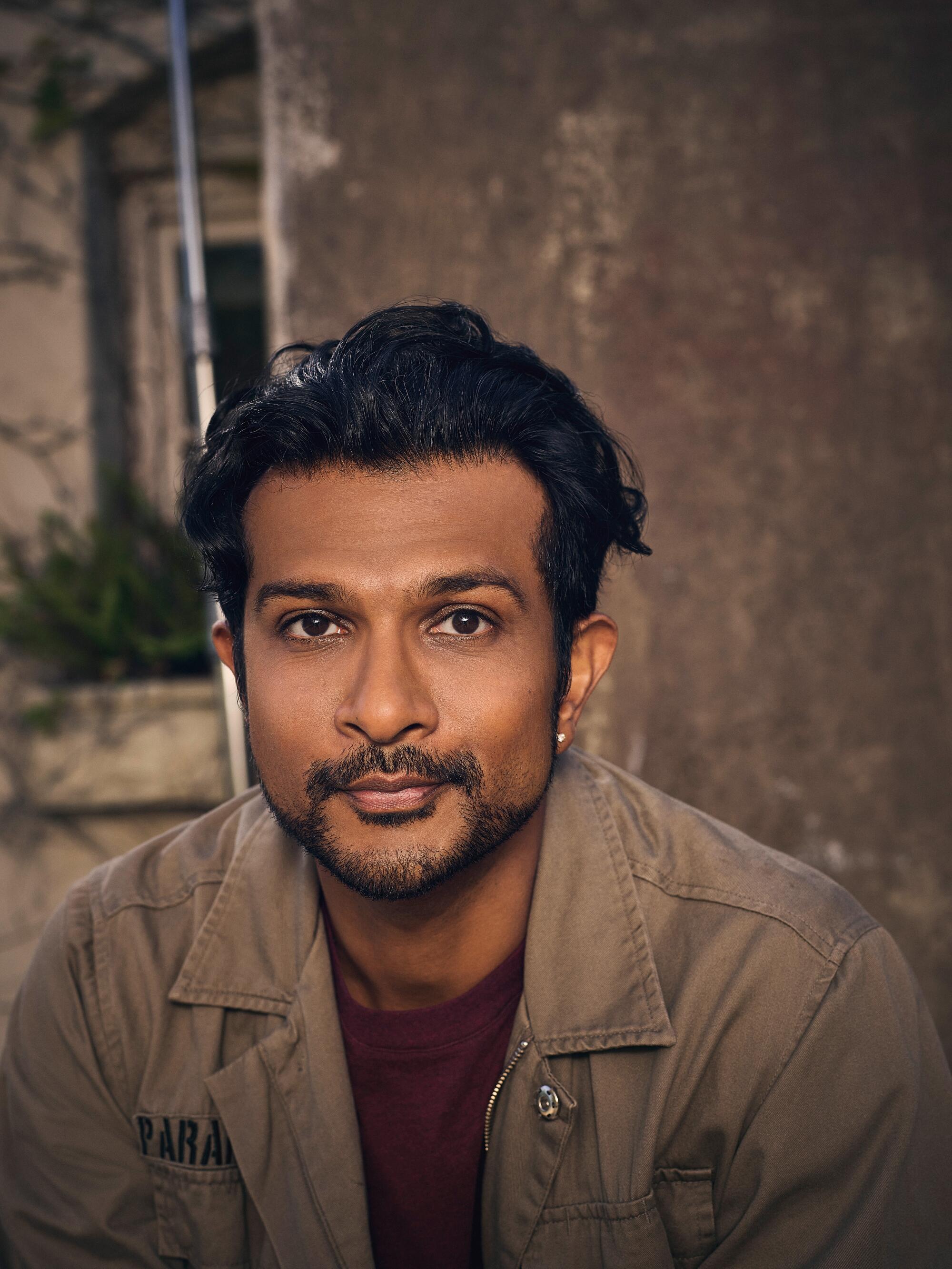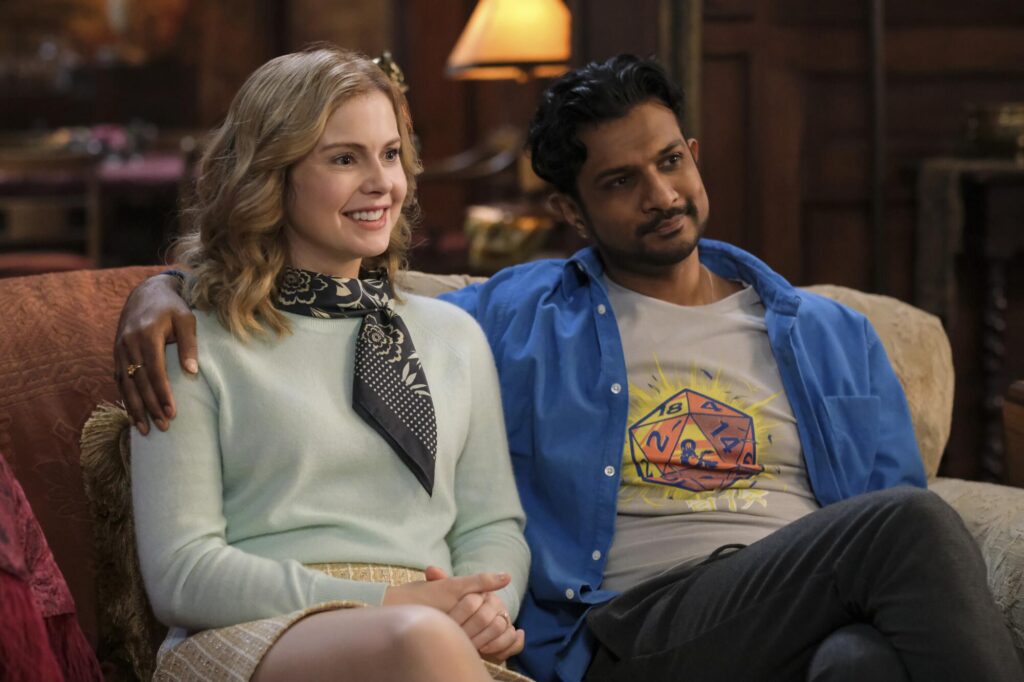As the central couple of the CBS supernatural sitcom “Ghosts,” Rose McIver and Utkarsh Ambudkar are the audience’s eyes and ears into a heightened world where some spirited specters end up haunting their place of death in a kind of purgatory — but with a clever twist.
After a near-death experience, McIver’s type-A, freelance journalist Sam can see and communicate with the spirits, while Ambudkar’s free-spirited chef Jay cannot. That unique premise has transformed the stateside version of “Ghosts,” which is as much a retrospective of American history as it is a throwback to classic family sitcoms, into the second most watched comedy on network television (after “Young Sheldon”).
If the gaggle of ghosts form the show’s raucous heart, then Sam and Jay are the grounded eye of the storm. For three seasons, McIver and Ambudkar have played a married couple who uprooted their lives to turn the quaint country house they inherited into a bed-and-breakfast. Although some may balk at the idea of their spouse being able to communicate with the deceased, the writers wisely chose to make Jay immediately accepting of Sam’s new abilities, which has not only allowed them to get into comic hijinks together but also made them a pair worth rooting for.
Rose McIver plays Samantha, who can see and talk to the ghosts inhabiting her new home. Utkarsh Ambudkar is Jay, who can’t see the spirits in “Ghosts.”
(Bertrand Calmeau/CBS/CBS)
“Jay is the definition of unconditional love,” Ambudkar says on a recent video call with McIver. In return, Sam gives Jay a sense of purpose and drives their adventures with the ghosts. “It feels really good to be able to play a loving couple onscreen who’s going through a lot and acknowledges it.”
“And who still choose each other at the end of it all,” McIver adds. “There’s a reason that all the ghosts are charmed by them, that they want this couple to work out. It was a really smart play to have Jay be such a champion of hers, because everybody’s now his biggest fan.”

“It was a really smart play to have Jay be such a champion of hers, because everybody’s now his biggest fan,” Rose McIver says of the “Ghosts” couple Sam and Jay.
(Chris Ryan Ross / Paramount+)
Much like their characters, McIver and Ambudkar’s personalities complement one another. Whereas McIver likes to approach her work more technically and methodically, Ambudkar is more spontaneous and improvisational. Over time, the actors have developed a shorthand with each other — she knows when he is going to go off script, and he knows that she is always looking at the bigger picture. The result feels more like an everyday married couple who can finish each other’s sentences. “So much of the success that happens onscreen is a direct result of harmony offscreen,” Ambudkar says.
And that’s not to mention the difficulty of both of their jobs. “Utkarsh can’t interact with 80% of the cast, and Rose has to do takes of whole scenes where she’s reacting to multiple people who aren’t even there,” says executive producer Joe Wiseman, who serves as co-showrunner with Joe Port. For her part, McIver notes that it has gotten easier with muscle memory to remember eye lines, but she still essentially has to play two versions of the same scene.
As Ambudkar puts it, McIver has to figure out how to “find the time and space to include Jay while also playing whack-a-mole with the ghosts.” On the flip side, McIver says Ambudkar knows how to “add color” and “fill in the details” of scenes without taking away from the ghosts’ plot lines.
Port adds that the writers have leaned into the absurdity of this concept: “We have Sam doing a play-by-play for Jay now of what’s going on in the scene, and he gets the highlights of what’s happening, and it provides another avenue for comedy for us.”
What makes McIver and Ambudkar’s performances particularly fun to watch is their wholehearted commitment to the bit, no matter how ridiculous — and that extends to more than just their own characters. For instance, Sam and Jay have both been possessed by one of the other ghosts, which has given the leads an opportunity to lean into the eccentricities of multiple characters at once. “Without Rose and Utkarsh committing to the premise, those episodes wouldn’t have worked,” Wiseman says.
McIver has likened working with the rest of the ensemble to creating an intricate Rube Goldberg machine, where a team has “so many tiny little pieces that all come together and that require the attention of each other.” The actors, like their characters, have found a way to cooperate and coexist in harmony; by the third season, Sam and Jay have found a way to set some boundaries with the ghosts while incorporating them somewhat seamlessly into their daily lives. “I love when [Sam and Jay] have a mission and when, in true sitcom fashion, they find some way to mess that mission up, it brings them and the ghosts closer to each other,” Ambudkar says.

“Ghosts” is “not for a small room of voters in Hollywood; it’s for the millions of people who live regular lives, who are hard workers, who want to feel a little bit of joy in their lives,” says Utkarsh Ambudkar.
(Chris Ryan Ross / Paramount+)
Despite being a hit with critics and audiences alike, “Ghosts” has remained largely overlooked in the awards conversation in favor of darker dramedies, which have begun to crowd the comedy categories. Although they agree that this kind of recognition would be particularly meaningful, McIver and Ambudkar have been more touched by the international and intergenerational appeal of the show, whose accessible and inclusive nature has opened up difficult but necessary conversations about mortality and tolerance.
“I’m really proud of the lack of snobbery in our show,” McIver says. “It encourages us to connect with people who aren’t — and don’t think — exactly the same as us, and there’s an openness and a warmth to that. It’s not a niche, dark, edgy comedy. It’s warm and loving, and I think that’s something that people really are needing on TV right now.”
At the end of the day, “Ghosts” is “not for a small room of voters in Hollywood; it’s for the millions of people who live regular lives, who are hard workers, who want to feel a little bit of joy in their lives. So I’m very proud that we’re not in the ‘cool kid club’ on this show,” Ambudkar adds of the veteran main cast of “misfits,” who were largely theater and character actors prior to starring on “Ghosts.” “To be fair, if being a loser means being the most popular show on television, sign me up!”

